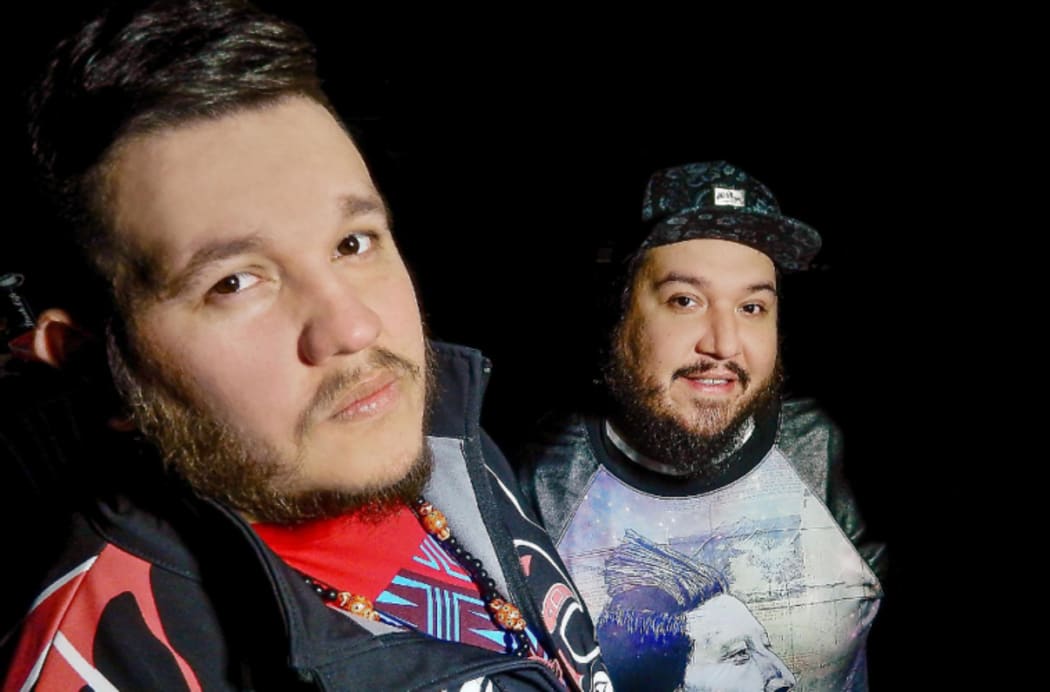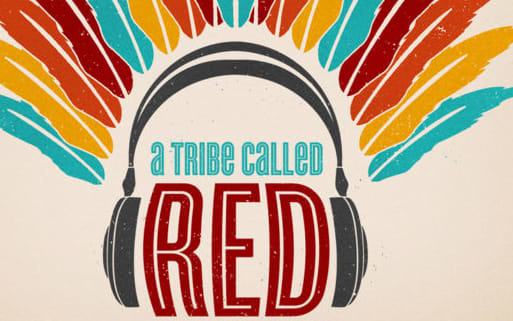A Tribe Called Red are an indigenous Canadian (First Nations) electronic duo who have been melding pow wow music (the drumming and singing that soundtracks Native American social gatherings), with modern electronic forms for the last decade.

A Tribe Called Red Photo: supplied
In 2007 Ehren "Bear Witness" Thomas started a club night in Ottowa Canada with his friends Dan "DJ Shub" General and Ian "DJ NDN" Campeau. Called Electric Pow Wow, it featured a mix of pow wow music alongside more contemporary genres like dubstep and moombahton.
According to Bear, for three indigenous DJs “to actually claim that space within the urban environment ended up being a lot more than just us playing a party. The reaction we got from people was ‘ok, you guys need to keep doing this now’”.
This was the genesis of A Tribe Called Red, a project which over three albums has given pow wow music an electronic upgrade.
Bear spoke to RNZ Music’s Tony Stamp, ahead of Tribe’s appearance at Auckland Arts Festival.
At the start you were using existing recordings (of First Nations music) as the sample material. How has sourcing that music changed?
With our second album we started a relationship with a label called Tribal Spirit based in Quebec. They’re a grass roots pow wow label. They’re very responsible to the drum groups that are on the label, and everything is split equally.
That was something that was important to us – not only were we being financially responsible to the drum groups that we were sampling, but also we had their permission.
There are also cultural responsibilities. We had direct contact with the groups now, and we follow protocol and get permission to use their songs.
We got them to record the pow wow tracks in ways that would allow us to use them easier.
So they had the drums and the vocals split. Then they started to split the men and the women which was really exciting for us, because you don’t usually hear just women singing (in pow wow music).
Our song ‘Sisters’ grew out of that. We had something to work with that we never had access to, so we made a song dedicated to indigenous women.
It sounds like you’re providing opportunities for other First Nations musicians to be heard.
Definitely. We’re a very fortunate group, we came at the right moment in time when our community was ready to share the things that we’re sharing with the rest of the world, and the rest of the world was also interested in listening.
There’s been no shortage of talented musicians and artists in the indigenous community. I’m a third generation artist, so I know that these talented people have always been there.
We’re using our culture in our music. If we weren’t being responsible to the people in the culture whose shoulders we’re standing on, who helped pave the way for us, and are allowing us to do what we do today, then we’d be messing up pretty bad.
When you perform live you have multimedia presentations with stereotypical images of indigenous people from film and TV. For example, a clip from Back To The Future 3 with the DeLorean being chased by Native Americans.
A lot of the reasons that I put these images up is that a lot of them were heroes that I created for myself when I was growing up.
One I always talk about is the character Billy from the movie Predator. He’s one of my favourite characters, because although he is this one dimensional stereotypical misrepresentation, he’s the one who Arnold (Schwarzenegger) turns to, to get him out of trouble every time.
He’s one of the only characters who stands his ground and fights the Predator head on. So to me growing up, this guy was a superhero.
So I like to take a lot of those images and recontextualise them. Take them out of that space that didn’t give them a voice, and allow them to have the voice that I gave them in my fantasies.
You brought up one of my favourite images, the Back To the Future one. That’s one’s a great example of the reaction I like to see from non-indigenous people.
People say ‘Oh I used to think that was so funny, and I looked at it tonight and realised how racist it was’.
You have this opportunity to hit people with these images – not in an aggressive way, not in a way that’s screaming at people that they’re wrong, or wrong for laughing at them. I laugh at them, I think they’re ridiculous!
But knowing that these things are wrong, that they’re misrepresentations – there’s so much to learn from that.
First Nations people in Canada, like indigenous people the world over, are still facing systemic racism. Have you seen a willingness to engage with that more?
Yeah, there’s been a huge change in recent years. We’re part of that change in consciousness.
When I was growing up people didn’t want to hear what indigenous people had to say, and definitely not outside our community.
It’s over twenty years ago now, but there was a standoff in a community called Kahnawake. It’s known as the Oka standoff.
It was over a golf course, and access to indigenous land. It turned into an armed standoff. The army was called in against indigenous people on their own land.
At that time nobody was interested in what anybody had to say. It had to get to that point before anybody would listen.
The problems haven’t changed that much, but there’s a voice now. There was a movement in recent years here called Idle No More.
What that ended up being about was breaking the history of silence of indigenous people. When you live through hundreds of years of genocide, you start to not want to complain.
You start to not want to stand up, because you’ve been pushed down so many times.
There’s always been an activist movement here, but I think Idle No More was a moment when indigenous people decided to say ‘enough is enough, we’re not going to be silenced’.

A Tribe Called Red Photo: supplied
A Tribe Called Red play Festival Playground Music Arena in Auckland on March 24th with Ria Hall and Tiki Taane.

